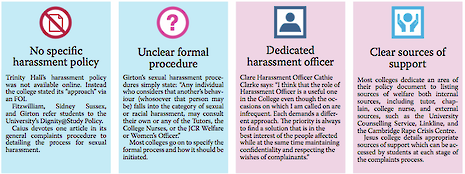Cambridge's Disciplinary Procedure
Colleges’ harassment policies ‘shocking’
A Varsity investigation has revealed that sexual harassment policies in colleges fail to protect students


Sexual harassment policies of colleges at the University of Cambridge could cause “distress to students”, a Varsity investigation has revealed.
There are marked discrepancies in the procedural clarity of policies across the University. Concerns have also been raised over inconsistencies in welfare provision detailed by the policies.
Harassment policies describe what actions an institution will take should one of its members report a case of sexual harassment or assault.
CUSU Women’s Officer Lauren Steele said that the complaints process “is often not oriented around the student’s needs and desires but taken into members of the college’s hands,” and that “the inconsistency across colleges and lack of specified procedures means that cases may not always be handled with these Best Practice Guidelines at play.”
A number of college policies suggest that as far as possible cases should be resolved informally.
Emmanuel College’s policy states: “Since formal complaint is commonly stressful and burdensome to all parties, it is important to make every effort to achieve resolution informally before resorting to it”.
Resolving complaints through mediation is cited as the best option at Downing, with its policy stating that the college hopes that most cases of harassment can be dealt with by “providing information about the consequences of offensive behaviour,” with the aim of “establishing communication between the individuals involved”.
Amelia Horgan, a former Women’s Officer at King’s, is currently helping to draft a revised sexual harassment policy for her college. She wanted to create a policy sensitive to the psychological trauma caused by encounters between the complain- ant and the accused. She said: “We wanted to keep the students separate until the investigation was carried out, which included allowing them to live in separate places if that’s what they wanted.”
Norah Al-Ani, the Development Officer at Cambridge Rape Crisis Centre, said that she found the wording of some of the policies “shocking”.
The University’s Dignity@Study policy, upon which a number of colleges base their own complaints policies, says: “If your complaint is not upheld and is found to be malicious or vexatious, disciplinary action may be taken against you.” This wording is widespread in University harassment policies across the country.
“All the emphasis here is on potential victims being accused,” Al-Ani said. “It perpetuates the myth that those who experience sexual violence make false allegations. “In reality the number of false sexual harassment and assault allegations are extremely low.”
Maggie Bridge, the Women’s Officer at Gonville and Caius, criticised the section of her college’s general policy which states that it “will take less seriously comments and suggestions that seem frivolous”. She said: “A report of sexual harassment or assault is never ‘frivolous’. It shows a real lack of nuanced thought about this issue, and therefore a real lack of any kind of proper provisions for it as and when instances arise.”
Jennifer*, who reported an incident of sexual assault involving a tutor at her college, said that she found the words “vexatious or malicious” intimidating. She said: “When you’re low and have just been victimised, the fear of saying the wrong thing is so strong: the idea that your words could potentially be scrutinised and that you could be penalised for what you say is always in back of your mind.”
She also pointed towards lack of clarity in her college’s harassment policy: “I approached a tutor who had to check the college guidelines first as reporting of cases is so rare. When I saw them I was unnerved by the shortness of the policy. It didn’t seem very clear.”
Policies are often brief, with bullying and harassment dealt with under the same procedural guidelines. Gonville and Caius does not have a sexual harassment policy that is independent of their general complaints procedure, and four colleges – Sidney Sussex, Trinity Hall, Fitzwilliam and Girton – do not have a sexual harassment policy individual to their college.
Al-Ani emphasised the importance of standalone policies that deal with sexual harassment and assault. “If it’s incorporated into a general policy, it becomes difficult to give it the space to describe what it is, and it shows that the college isn’t recognising the experiences of students.” She added: “Standalone policies show that the college is taking the issue seriously”.
Often students are called before disciplinary bodies for the formal complaint to be investigated. Jennifer suggests that this process was unsympathetic to the sensitivity of her case: “I wasn’t treated as a vulnerable witness. I felt like I was being closely scrutinised and questioned, and that a lack of sensitivity was shown whilst dealing with that very painful period of my life.”
“I felt so scrutinised and so vulnerable that all I wanted to do was get out of there as quickly as possible”.
Most colleges detail a comprehensive list of internal and external sources of welfare advice. However, six colleges – Churchill, Corpus, Fitzwilliam, Caius, Queens’ and Selwyn – make no clear reference to welfare provision for complainants in their harassment policies. Only Jesus College makes reference to sources of welfare throughout the process, specifying where complainants can go for support at each stage. Seven colleges have dedicated Harassment Officers.
Al-Ani says that it is “essential” that students be made aware of sources of welfare support throughout the process. “Otherwise it could have a hugely detrimental impact on someone’s self confidence and self belief.”
At St Catherine’s, Queens’, and Pembroke, guidelines ask for students considering making a complaint to collect their sexual harassment policy in person from members of staff. At a number of colleges, students are asked to initiate the complaints procedure themselves by describing their experience in a formal letter, often without any guidelines or template for this letter and with no support.
A spokesperson for the University said: “The Dignity@Study guidance sets out recommended procedures for dealing with complaints of inappropriate behaviour across the University. The guidance, which is intended primarily for students, has been approved and commended to Colleges for adoption by the Senior Tutors’ Committee.
As independent legal entities, it is appropriate for Colleges to have their own complaints and review procedures within the context of this guidance. Colleges are always prepared to discuss areas where there appears to be a lack of clarity. This is best done through student representation on appropriate committees for student welfare.”
Steele noted that the University is working with the Women’s Campaign “in potentially reviewing and creating policy at both University and college levels, introducing training and workshops for staf and students.”
For Jennifer, these changes will come too late.“I felt like I was the guineapig,” she says. “It’s good that procedures can be fixed after it all comes to light, but for the test cases the system often fails to protect vulnerable students.”
*Name changed to protect identity
 News / Colleges charge different rents for the same Castle Street accommodation2 March 2026
News / Colleges charge different rents for the same Castle Street accommodation2 March 2026 News / News in Brief: waterworks, wine woes, and workplace wins 1 March 2026
News / News in Brief: waterworks, wine woes, and workplace wins 1 March 2026 News / Climate activists protest for ‘ethical careers policy’1 March 2026
News / Climate activists protest for ‘ethical careers policy’1 March 2026 News / Private school teacher who lied about Cambridge degree barred from teaching27 February 2026
News / Private school teacher who lied about Cambridge degree barred from teaching27 February 2026 News / Angela Merkel among Cambridge honorary degree nominees27 February 2026
News / Angela Merkel among Cambridge honorary degree nominees27 February 2026








